Career clusters are groups of occupations and industries that have a set of foundational knowledge and skills in common. There are 16 nationally recognized clusters within which are multiple career pathways. The Illinois Career Clusters, Pathways, and Programs of Study Guide provides information on the implementation of career clusters, pathways and programs of study in Illinois.
Illinois Career Cluster Models for Race to the Top Areas
- Finance Brochure (pdf)
- Health Science Brochure (pdf)
- Manufacturing Brochure (pdf)
- STEM Brochure (pdf)
Programs of study are sequences of courses that incorporate a non-duplicative progression of secondary and postsecondary elements, which include academic and career and technical education content. Programs of study should start no later than the ninth grade and continue through at least two years of postsecondary education. Programs of study include opportunities to earn college credit (dual credit) in high school and lead to an industry-recognized credential or certificate at the secondary/postsecondary level, and/or an associate or baccalaureate degree.
Illinois Program of Study Self-Assessment
The Illinois Program of Study Self-Assessment Instrument (.docx file version or .pdf file version) was developed by Pathways Resource Center in partnership with the Illinois State Board of Education. The assessment is built based on the standards for programs of study as established in the Carl D. Perkins Career and Technical Education Act of 2006 (Perkins IV). The assessment is aligned with the Office of Career, Technical, and Adult Education (OCTAE) design framework, which contains 10 components that support program of study development and implementation, is referenced throughout this self-assessment so that Illinois educators can align their school districts processes with this framework.
Illinois' Programs of Study
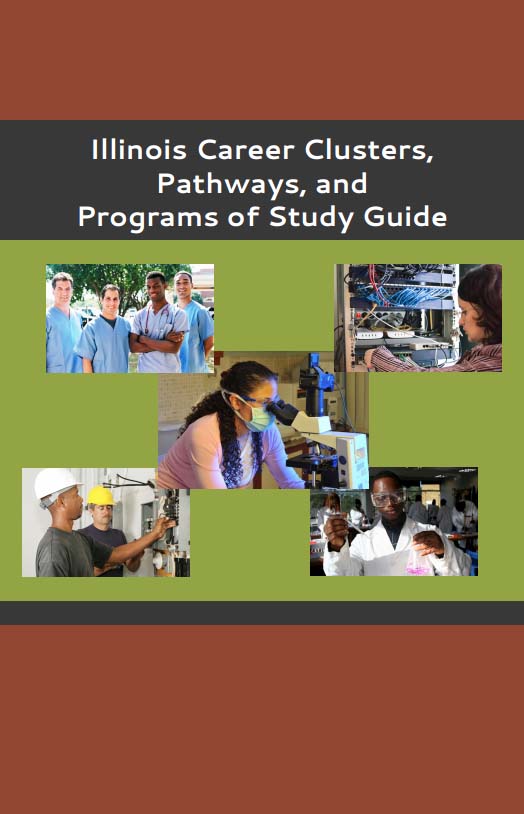
The Illinois Career Clusters, Pathways, and Programs of Study Guide booklet provides information to multiple stakeholders on the implementation of career clusters, pathways and programs of study in Illinois.
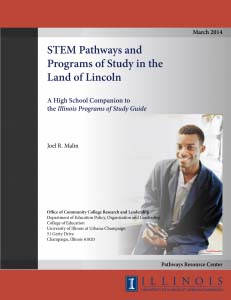
The STEM Pathways and Programs of Study in the Land of Lincoln: A High School Companion to the Illinois Programs of Study Guide is a companion document that builds upon the Office of Community College Research and Leadership’s Illinois Programs of Study Guide and is organized around six guiding principles for developing and implementing robust programs of study. It also integrates recent findings and includes a set of suggested implementation steps and phases. It is attentive to the Illinois context and focused primarily from the vantage point of the secondary educator and leader. It is aimed to enhance the effectiveness of educators and partners who wish to develop or improve STEM programs of study and associated career pathways for students.
Additional Programs of Study Resources
The Using Labor Market Information to Analyze Programs of Study and Career Clusters webinar provides a step-by-step approach to utilizing labor market, workforce and career information available through the Illinois Department of Employment Security (IDES). Not mind-numbing statistics, but a practical analysis geared to education planners for local/regional employment demand and trends linked from the IDES, Illinois Pathways and PRC websites. The webinar was hosted by the PRC, with presentations from Mitch Daniels (Illinois Department of Employment Security), Jeanne Kitchens (IL workNET), and Jason Tyszko (Department of Commerce and Economic Opportunity). Additionally, a profile of the Agriculture, Food, and Natural Resources cluster is provided as an example of a product from a labor market analysis.
High School Graduation Requirements
The National Trends in High School Graduation Requirements and Diploma Options: Considerations for Policy and Practice in Illinois report provides an overview of current minimum high school graduation requirements across the nation and examines the national trend related to increasing high school graduation requirements. Trends in total graduation requirements, as well as in English, mathematics, science, and social studies, are presented and analyzed. Additionally, various high school diploma and endorsement options are discussed. The paper concludes with four recommendations for Illinois high school educators and policy makers, to ensure high school graduation policies are put in place to ensure that all students complete an academic program that fully prepares them for college and career success.
Promoting College and Career Readiness
The Promoting College and Career Readiness: Recommendations for Illinois High Schools report provides an overview of recent research on the effects of academic preparation for our nation, including the benefits and costs of education to society. Information also is shared on labor projections and concerns about changing workforce demands in the United States. The subsequent section describes the performance of high school students in Illinois and throughout the nation on standardized achievement tests, followed by a discussion of research related to the preparation of entering college students for academic success. The paper concludes with 10 recommendations for Illinois high school educators, to ensure that high school students have access to a rigorous, relevant curriculum that adequately prepares them for college and workplace success.
Illinois Shared Learning Environment
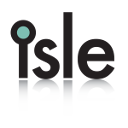 Illinois Shared Learning Environment (ISLE) is a free online platform that empowers educators by making readily available a collection of educational resources that they can utilize to personalize learning and drive success for their students. ISLE is partnering with the STEM Learning Exchanges to share curriculum resources with schools throughout Illinois.
Illinois Shared Learning Environment (ISLE) is a free online platform that empowers educators by making readily available a collection of educational resources that they can utilize to personalize learning and drive success for their students. ISLE is partnering with the STEM Learning Exchanges to share curriculum resources with schools throughout Illinois.
Illinois CTE Curriculum Revitalization Project
The mission of the Illinois Curriculum Revitalization Project is to “Design, delivery, and evaluate innovative curriculum resources for the Illinois Career and Technical Education community.” Curriculum Revitalization supports teachers grades 9 to 12 with professional development and lesson plans with accompanying PowerPoint presentations, visual masters, test bank items, and lab sheets aligned with Common Core, Illinois, national workplace standards.
Curriculum Alignment
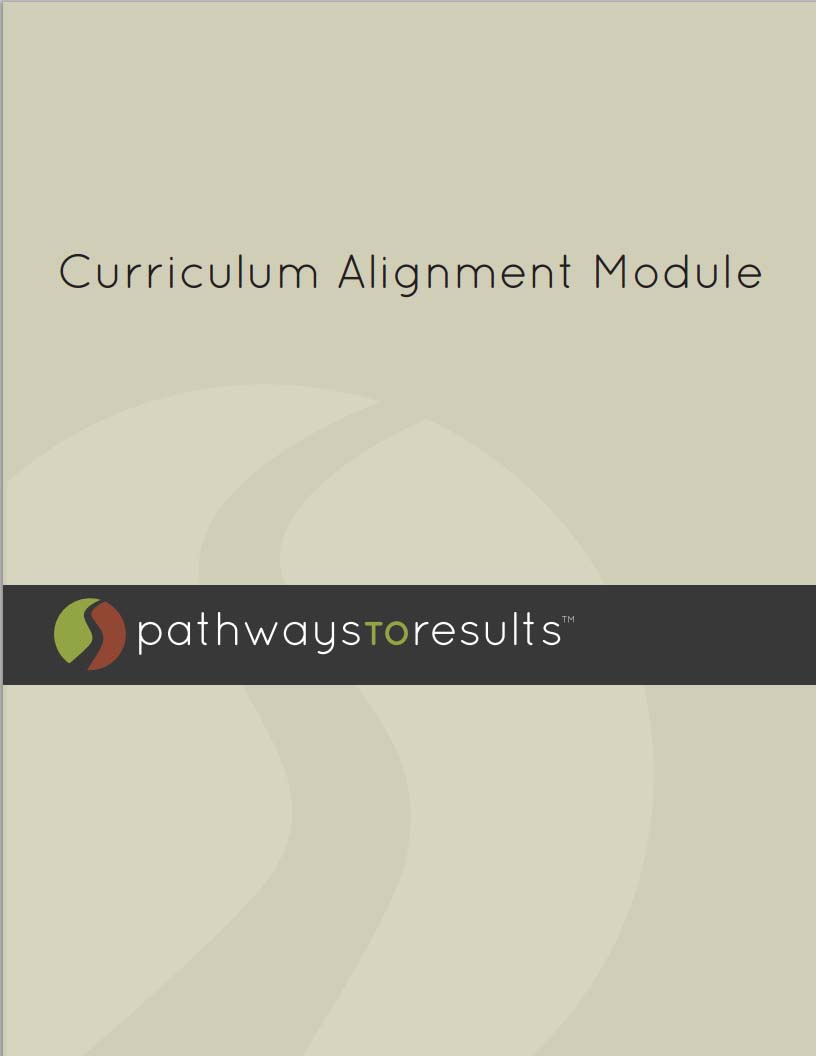 The primary purpose of Curriculum Alignment Module is to assist P-20 partnerships in the curriculum alignment process for P-20 STEM programs of study. By STEM, we refer to the full range of disciplinary fields associated with Science, Technology, Engineering, and Mathematics, particularly emphasizing content areas that are neglected by STEM initiatives including career-technical and technology-oriented education. This module begins by identifying the key instructional staff, administrators, and business and industry partners to address program of study (curriculum) alignment and development needs and ends with planning for the evaluation of these activities.
The primary purpose of Curriculum Alignment Module is to assist P-20 partnerships in the curriculum alignment process for P-20 STEM programs of study. By STEM, we refer to the full range of disciplinary fields associated with Science, Technology, Engineering, and Mathematics, particularly emphasizing content areas that are neglected by STEM initiatives including career-technical and technology-oriented education. This module begins by identifying the key instructional staff, administrators, and business and industry partners to address program of study (curriculum) alignment and development needs and ends with planning for the evaluation of these activities.
Curriculum Evaluation for the Improvement of STEM Programs of Study Webinar
Thursday, October 2, 2014
10:00-10:30 AM
Recently, the Pathways Resource Center produced a new module, Curriculum Evaluation for the Improvement of STEM Programs of Study. It complements the Pathways to Results (PTR) process and is meant to guide educators through a series of steps as they evaluate and improve their STEM curricula. The module also includes several templates. Participants learned to:
- Identify and craft evaluation questions
- Identify evaluation criteria
- Effectively secure support for the evaluation, and
- Develop, organize, and present findings
Joel Malin, who authored the resource, provided an overview and some tips regarding its use.
Curriculum Evaluation for STEM Programs
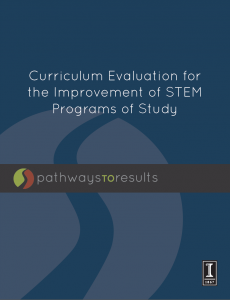
Pathways Resource Center has produced a module for educators, Curriculum Evaluation for the Improvement of STEM Programs of Study. It is complemented by Pathways to Results (PTR) and is meant to guide educators and their partners through a series of steps as they evaluate and improve their STEM curricula. It also includes several templates, included in the module as appendices and as separate documents below.
Pathways Resource Center provided a webinar on the processes outlined in this module on October 2, 2014. The PowerPoint for this webinar is available here: Curriculum Evaluation STEM POS webinar. Additionally, the following templates are provided to support the curriculum evaluation process.
Program of Study Curriculum Template
The Program of Study Curriculum Template serves a number of crucial functions for educators, parents, and students. It assists students and parents in the decision-making process as they explore career options. Also, it can serve as a key communication device for educators to come together and support the interconnections in the P-14 or P-16 curriculum. It also notes work-based learning experiences and assessments or certifications that can be attained within the POS.
An Individualized Learning Plan is a living document that is created through a student-centered process that results in a customized educational plan that is reflective of the student’s academic, career, and personal goals. Most school districts using Individualized Learning Plans, elect to start engaging students in the planning process between sixth and eighth grades. The Individualized Learning Planning process and the resulting plan begin with a broad framework and become increasingly specific as the student engages in and develops skills toward a specific program of study and career pathway.
The Achieving Their Goals: Implementing an Individualized Learning Plan Process to Build Student Success guide provides school districts with a framework to develop high quality Individualized Learning Plans and a model for implementing an Individualized Learning Plan process. Tools, templates, and additional resources are provided to assist professionals as they implement ILP processes and support students’ career exploration and pursuits.
Supporting students in learning about themselves, career options, goal setting, and planning are key aspects of the Individualized Learning Plan (ILP) process. The student-centered ILP process encourages students take an active role in assessing, reflecting on, and planning based on their academic, career, and personal goals. This process provides an entry point for students to engage with their selected career area. ILPs are living documents that are created through a student-centered process that results in a customized educational plan that is reflective of the student’s academic, career, and personal goals. Individualized Learning Plans are part of a comprehensive school-counseling approach that has been shown to improve students’ college and career readiness. Below are additional resources for developing Individualized Learning Plan process at your school or district.
- Resources for the ExploringandPlanningPhases of the Individualized Learning Plan process
- Resources for the TransitioningPhase of the Individualized Learning Plan process
The Individualized Learning Plans: An Entry Point to Programs of Study and Career Pathways research brief provides an overview of research on the provides an overview of existing research on Individualized Learning Planning process, including key concepts and components of Individualized Learning Plans and the benefits associated with these processes. Recommendations for school districts who are implementing Individualized Learning Planning process also are provided. For addition information and resources on current research on Individualized Learning Plans readers are encouraged to visit the National Collaborative on Workforce and Disability for Youth’s website on Individualized Learning Plans.
Building Students’ Portfolios: Integrating Course Artifacts into Individualized Learning Plan Webinar
Individualized Learning Plans assist students in exploring and identifying career and educational opportunities that support their personal, educational, and career goals. Through the Individualized Learning Plan process students develop a portfolio that captures their experiences, products, and accomplishments. This personalized portfolio allows students to reflect on their skills and interests, as well as demonstrate their knowledge, skills, and abilities as they pursue educational and employment opportunities. Faculty play a critical role in supporting the students’ Individualized Learning Plans and portfolio development. This webinar focused on the faculty’s role in identifying and integrating artifacts from the courses they teach into students’ Individualized Learning Plans.
Partnerships are foundational to the development and/or improvement of programs of study. Working together, committed educators from all levels, employers, and community members can ensure programs are up-to-date, articulated for smooth transitions, and contain authentic work-based learning experiences. Through the sharing of multiple perspectives and rich discussion, the eventual solutions or strategies gain credibility and momentum toward implementation. In this webinar, we provided an overview of the value of partnerships and key steps in developing and strengthening partnerships for STEM programs of study. This webinar was provided on December 9, 2013. The PowerPoint from this webinar is available at Partnerships Webinar PowerPoint, and the recording is available at Partnerships for Programs of Study Video.
Partnerships for Programs of Study Webinar
Partnerships are foundational to the development and improvement of P-20 programs of study. There are many benefits derived from comprehensive partnerships in education including:
- the elimination of duplication in instruction and promotion of smooth transitions from one institution to the next through joint curriculum alignment processes;
- the provision of multiple individualized supports as dictated by student need; and
- the focus on student outcomes and shared accountability for student success.
The Strengthening Partnerships module provides a process for P-20 institutions to develop effective partnerships through a six step process. The six steps, which are covered in detail in the report are:
- Set Goals and Outcomes
- Identify Partners
- Define the Governance Structure
- Identify Effective Operating Strategy
- Evaluate the Partnership
- Determine Sustainability
The module includes advice on avoiding common mistakes made in educational partnerships and provides a listing of additional resources on the topic.
The Pathways to Results: High School Supplement provides high school personnel interested in improving equitable student outcomes an overview of how the Pathways to Results process works in a high school setting. Additionally, the supplement provides a crosswalk (below) that illustrates how Pathways to Results aligns with other school improvement processes.
Learn more about Pathways to Results.
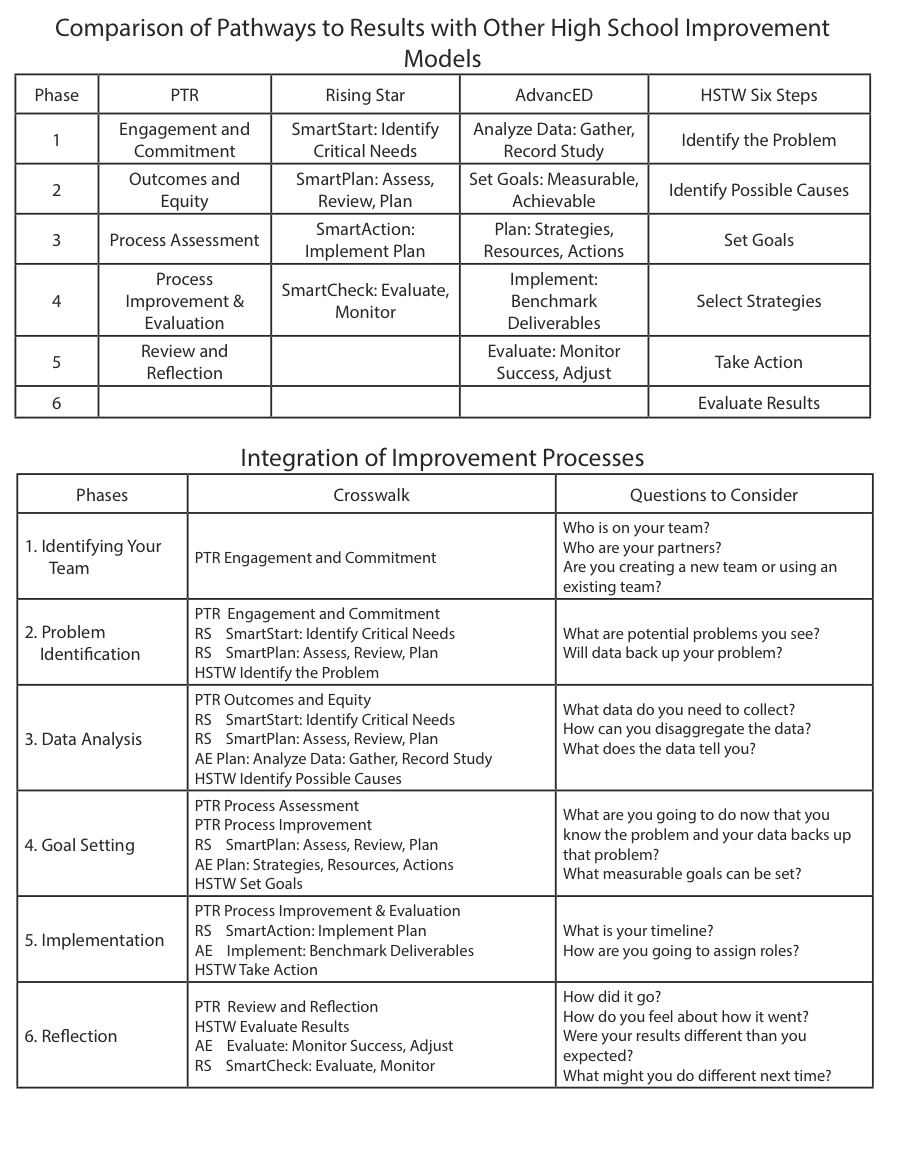
Rising Star
Rising Star is Illinois’ adaptation of a web-based platform for continuous improvement at the district and school level that is facilitated through the Illinois State Board of Education. Rising Star is supported by the National Center on Innovation and Improvement and funded by the Department of Education. Rising Star focuses on 4 categories for improvement: (1) continuous improvement, (2) learning environment, (3) educator quality, (4) teaching and learning. Eight elements are nested in these 4 categories, and nested in them are 152 indicators of effective practice.
The Illinois State Board of Education has provided a series of webinars and reports on Rising Star. More information can be found at:
- Welcome to Rising Star: An Introductory Webinar for Internal Coaches
PowerPoint presentation
Illinois State Board of Education - Lighting our path to stellar learning
PowerPoint presentation
Illinois State Board of Education, Center on Innovation & Improvement - Illinois Rising Star Indicators and Race to the Top Expectations(n.d)
Crosswalk of Indicators
Illinois State Board of Education - Statewide System of Support: Building Local Capacity
Operation Manual (August 2011)
Illinois State Board of Education
AdvancED
The goal of AdvancED is to advance educational excellence through use of a set of guiding principles and practices for school improvement. AdvancED uses an improvement life cycle model that includes five components: (1) college and analyze data, (2) set goals, (3) plan, (4) implement, and (5) evaluate. Information about strategies and solutions, school improvement research, research-based survey tools, and policy and advocacy information are available on AdvancED website.
High Schools that Work
The goal of High Schools That Work is to utilize research-proven strategies to help states transform their public high schools. The mission of High Schools That Work is to create a culture of high expectations and continuous improvement in high school and the middle grades. High Schools That Work is designed on the premise that most students can master complex academic and technical concepts is schools create an environment that encourages learning for students. High Schools that Work is an initiative of the Southern Regional Education Board. Key concepts in High Schools That Work include:
- Goals for Continuous Improvement and Conditions for Accelerating Student Achievement
- Ten Key Practices
- Improving Career/Technical Education
- Research on High Schools that Work
The Facing Equity: Understanding P-20 Equity Conscious Leadership for College and Career Pathways focuses on concepts, frameworks, and practices that help leaders vision a “pathway to equity” for all students to gain access to college and careers. This report is intended for P-20 leaders such as principals, curriculum directors, department heads, deans, transition specialists, and school counselors. This report also is beneficial to policymakers who aim to understand the policy implications of equity issues that practitioners face in educational institutions.
Embracing the call for attention to the responsibilities and practices of P-20 leaders who must face issues of equity pertaining to student access to college and career preparation and opportunities, the report focuses on the following:
- What is equity?
- How is equity defined in P-20 scholarship?
- What do Pathways to Equity look like in practice?
- What is equity-minded leadership across the secondary-postsecondary pipeline?
Extending Access to Career Pathways for All
IllinoisCTE.org provides tools and insights on how to extend access to career pathways for students in special populations. Examples of tools provided by this site include a) Illinois Special Populations Professional Development Tool, b) Civil Rights Self-Assessment: A tool for the Illinois Education Community, and c) the Non-Traditional Career Toolkit.
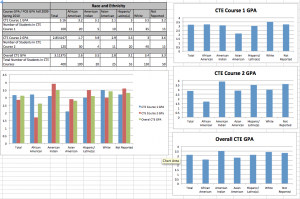
The following templates were developed for use by high school educators who are interested in tracking data and examining equity within their schools across several dimensions of student performance. Data generated by templates such as these can serve as a useful starting point for the faculty to begin to engage in conversations related to equity and equality within the school organization. Each of these templates illustrates indicator data that have been disaggregated by various student subgroups (including race/ethnicity), in an effort to help school district officials identify areas in which inequities are impacting student outcomes. High school teachers and administrators are encouraged to customize these templates to best meet their needs and to develop additional templates that can be used to disaggregate data related to various student performance metrics.
Equity Templates:
Many universities throughout the state of Illinois have designated centers that are focused on STEM Education outreach and research. These centers represent an opportunity for building connections and continuing among P-20 STEM education efforts. Many of these centers work directly with P-12 districts and their students, support STEM education research and provide professional development for P-20 STEM educators. For a national listing of University Centers please visit the national map of University STEM Centers compiled by the Center for STEM Research, Education, and Outreach at Southern Illinois University Edwardsville.
Descriptions of University STEM Centers
Center for Mathematics, Science, and Technology
Illinois State University
The Center for Mathematics, Science, and Technology (CeMaST) mission is to stimulate, conduct, and support integrative science, technology, engineering, and mathematics (STEM) education activities and scholarship. The Illinois State University campus community is committed to the pursuit of learning and scholarship, individualized attention, public opportunity, diversity, and civic engagement. CeMaST contributes to these core values by pursuing and supporting scholarship in STEM education for all students. CeMaST major goals are:
- Goal 1: Stimulate and support activities and research on teaching and learning that align with campus, state, and national STEM priorities.
- Goal 2: Provide leadership to and foster cross-disciplinary collaborative STEM activities and research on teaching and learning.
- Goal 3: Direct efforts to increase the diversity of STEM communities through innovative programming, partnerships, and outreach.
Center for Science and Math Education
Loyola University Chicago
The mission of Center for Science and Math Education is; “scientific and mathematical literacy is essential to making decisions that foster a just society and a healthy planet. Teachers provide crucial opportunities for all students to attain such literacy. Through partnerships, programs, and research focusing on area schools, the Center for Science and Math Education (CSME) is dedicated to developing teachers’ understanding and implementation of high quality science and math instruction.”
Center for STEM Research, Education, and Outreach (STEM Center)
Southern Illinois University Edwardsville
The SIUE STEM Center is dedicated to building a community of researchers and educators who together innovate ways to engage students and the public in STEM fields. The Center provides a wide variety of outreach activities, including organizing science competitions, hosting teen science cafes, providing teacher professional development, and building online citizen science communities. The Resource Center loans instructional equipment and materials to any educator at no-cost, including probeware, models, curriculum kits, and many other items. Additionally, the STEM Center is a research center with a diverse research agenda including studies on formal and informal learning in STEM among K-12, undergraduate, and general public audiences. The team of researchers and content creators is working to define best practices in brick-and-mortar and virtual STEM initiatives.
I-STEM Education Initiative
University of Illinois at Urbana-Champaign
The I-STEM Education Initiative (I-STEM)—a campus coalition grounded in Education and led by the Office of the Provost—involves Liberal Arts & Sciences, Education, Engineering, Agriculture, Veterinary Medicine, Applied Health Sciences, Medicine, Library and Information Sciences, Social Work, the National Center for Supercomputing Applications, Beckman Institute for Advanced Science and Technology, the Institute for Genomic Biology, and other units. I-STEM collaborates with Illinois campus units and external organizations locally and around the world to meet four goals:
- Facilitate P–16 STEM Education Outreach.
- Improve STEM Teacher Training and Professional Development Quality.
- Foster Undergraduate and Graduate STEM Education Reform.
- Shape Policy and Advocate for STEM Education.
I-STEM works with internal and external partners to evaluate STEM education programs, provide news coverage of STEM initiatives and events, to facilitate the development of education and outreach programs, and to help develop policies in Illinois and nationally that promote STEM education.
Office for Mathematics, Science, and Technology Education
University of Illinois at Urbana-Champaign
The Mathematics, Science, and Technology Education (MSTE) is a program at the University of Illinois at Urbana-Champaign whose mission is to enhance student achievement and teaching performance in the fields of mathematics, science, and technology. The program has evolved as a learning system — a community of practice that functions as a bridge among other such communities — promoting collaboration between widely dispersed academic researchers, K-12 school teachers, administrators and students at all levels, as well as supportive interactions with a board of experienced advisers.
STEM Center
DePaul University
The mission of the STEM Center is to coordinate and/or contribute to the development, implementation, and management of science and mathematics programs aligned with the mission of the University. The major goals of the Center are
- Develop and provide support for extracurricular science and mathematics programs within the university.
- Seek external funds for science and mathematics students and departments and administer and support programs developed with such funds.
- Develop and provide support for mathematics and science programs for K-12 teachers.
Across the state of Illinois there are numerous dedicated researchers studying STEM education. This directory is intended to foster opportunities for collaboration among researchers and practitioners serving the K-20 student population. Entities interested in collaborating with any of the researchers from the University of Illinois at Urbana-Champaign listed below, are encouraged to contact the I-STEM office who specializes in facilitating collaborative projects.
STEM Researchers
Gretchen Adams
Websites:
http://www.merit.illinois.edu
http://bit.ly/dts-illinois
Director, Chemistry Merit Program and Director of Undergraduate Studies, Chemistry Department
University of Illinois at Urbana-Champaign
Field of Study: Chemistry
Fouad Adb-El Khalick
Professor and Department Head
University of Illinois at Urbana-Champaign
Field of Study: Curriculum & Instruction (Science Education)
Jennifer Amos
Sr. Lecturer and Director of UG Programs
University of Illinois at Urbana-Champaign
Field of Study: Bioengineering
Paul Asunda
Graduate Faculty
Southern Illinois University at Carbondale
Field of Study: Workforce Education and Development
Arthur Baroody
Professor Emeritus of Curriculum & Instruction
University of Illinois at Urbana-Champaign
Field of Study: Early Childhood Mathematics Education
Bernhard Beck-Winchatz
Associate Professor
DePaul University
Field of Study: STEM Education
Debra Bragg
Edward William Gutgsell and Jane Marr Gutgsell Endowed Professor, Director of Office of Community College Research and Leadership
Website: http://occrl.illinois.edu/
University of Illinois Urbana-Champaign
Field of Study: Career and Technical Education, STEM Evaluation, Educational Transitions
Lingguo Bu
Faculty, Curriculum & Instruction
Southern Illinois University at Carbondale
Field of Study: Mathematics Education
Lisa Diaz
Extension Specialist and Adjunct Assistant Professor
University of Illinois at Urbana-Champaign
Field of Study: K-12 and Informal Learning, Extension Services (University of Illinois Extension), Youth-Adult Partnerships, STEM Inquiry, Youth Citizen Scientists, STEM pipeline for girls and minorities
Brian Fields
Professor
University of Illinois at Urbana-Champaign
Field of Study: Astronomy, Physics
Asim Gangopadhyaya
Professor, Physics
Loyola University Chicago
Field of Study: Science & Math Education
Pamela Gay
Assistant Research Professor
Southern Illinois University Edwardsville
Field of Study: STEM Education, Astronomy/Planetary Science
Jennifer Greene
Professor
University of Illinois at Urbana-Champaign
Field of Study: Educational Psychology, Evaluation
Bill Hammack
Professor
University of Illinois at Urbana-Champaign
Field of Study: Chemical & Biomolecular Engineering
Donald G. Hackmann
Professor, Director of Pathways Resource Center
University of Illinois at Urbana-Champaign
Field of Study: STEM Education
Stafford Hood
Shelia M. Miller Professor of Education
Director, Center for Culturally Responsive Evaluation and Assessment
Website: http://crea.education.illinois.edu
University of Illinois at Urbana-Champaign
Field of Study: Program Evaluation and Assessment
Wen-Hao “David” Huang
Associate Professor, Education Policy, Organization and Leadership
University of Illinois at Urbana-Champaign
Field of Study: Educational Technology, Educational Games, and
Learning Engagement through Technology
Barbara Hug
Websites:
http://education.illinois.edu/people/bhug
http://www.neuron.illinois.edu
Clinical Assistant Professor
University of Illinois at Urbana-Champaign
Field of Study: Science Education and Teacher Professional Development
David Jabon
Associate Professor
DePaul University
Field of Study: Mathematics, Science, and Engineering Education
Paul Kwiat
Websites:
http://research.physics.illinois.edu/QI/Photonics
Bardeen Professor of Physics
University of Illinois at Urbana-Champaign
Field of Study: Physics
Sharon Locke
Director, Center for STEM Research, Education, and Outreach
Southern Illinois University Edwardsville
Field of Study: STEM Education
Michael Loui
Professor Emeritus of Electrical and Computer Engineering
University of Illinois at Urbana-Champaign
Field of Study: Engineering Education
Sarah Lubienski
Professor and Interim Dean of Graduate College
University of Illinois at Urbana-Champaign
Field of Study: Mathematics Education
Stephen Marlette
Associate Professor
Southern Illinois University Edwardsville
Field of Study: Curriculum & Instruction/ Learning Standards
Anita Martin
Project Coordinator: EnList-Entrepreneurial Leadership in STEM Teaching and Learning
University of Illinois at Urbana-Champaign
Field of Study: Entrepreneurship in K-12 Public Education; NOE-Nature of Engineering
Danny Bernard Martin
Video: https://www.youtube.com/watch?v=tYneVA8kBp0
Website: http://education.uic.edu/content/danny-martin-phdhttps://www.youtube.com/watch?v=tYneVA8kBp0
Website: http://uic.academia.edu/DannyMartin
Professor
College of Education and Department of Mathematics, Statistics, and Computer Science
University of Illinois at Chicago
Field of Study: Mathematics, Education, Race and Ethnicit
Deana McDonagh
Chair of the Industrial Design Program
University of Illinois at Urbana-Champaign
Field of Study: Empathic Design Research
Jennifer McNeilly
Website: http://www.merit.illinois.edu
Director, Mathematics Merit Program
University of Illinois at Urbana-Champaign
Carole Mitchener
Associate Dean of Academic Affairs
University of Illinois at Chicago
Field of Study: Teacher Education
Frackson Mumba
Faculty, Curriculum & Instruction
Southern Illinois University at Carbondale
Field of Study: Chemistry Education
Joseph Muskin
Educational Coordinator
University of Illinois at Urbana-Champaign
Field of Study: Mechanical Science and Engineering
Carolyn Narasimhan
Professor, Mathematics / Director, STEM Center
DePaul University
Field of Study: Mathematics and Science Education
Leah Nillas
Associate Professor
Illinois Weslyan University
Field of Study: Mathematics Education
Margery Osborne
Professor
University of Illinois at Urbana-Champaign
Field of Study: Curriculum & Leadership
Ray Price
William H. Severns Professor of Human Behavior, Industrial and Enterprise Systems Engineering
University of Illinois at Urbana-Champaign
Field of Study: Leadership and Innovation
George Reese
Director of MSTE Office (Office for Mathematics, Science, and Technology Education)
University of Illinois at Urbana-Champaign
Field of Study: STEM Education, Improving Instruction in Mathematics and Science through the use of New Digital Technologies
Alexander Scheeline
Professor of Chemistry, Emeritus
University of Illinois at Urbana-Champaign
Field of Study: Chemistry
Rachel Shefner
CSME Associate Director
Field of Study: Center for Science/Math
Loyola University Chicago
Victoria Simek
Associate Director
DePaul University
Field of Study: STEM Education
Sharon Tettegah
Associate Professor
University of Illinois at Urbana-Champaign
Field of Study: STEM research, Digital environments (Technology) and Educational Psychology, Virtual Worlds and Games, Creativity and Innovation
Maria Varelas
Professor
University of Illinois at Chicago
Field of Study: Science Education
Debra Woods
Director of NetMath, Retired
University of Illinois at Urbana-Champaign
Field of Study: Department of Mathematics



